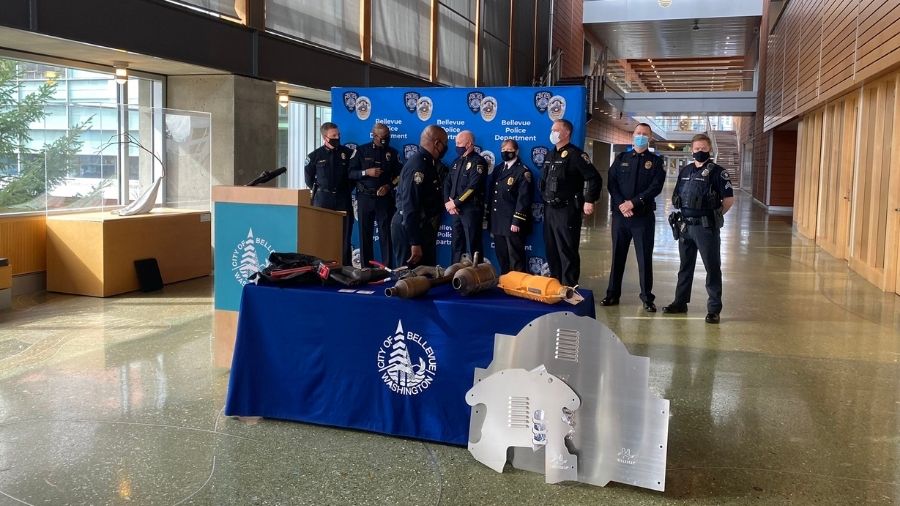Eastside police departments form Regional Catalytic Converter Task Force
Mar 2, 2022, 10:46 AM | Updated: 11:48 am

Police officers from the nine agencies of the Regional Catalytic Converter Task Force stand next to a table with a painted and etched catalytic converter (in yellow) and a regular metal catalytic converter. (Nicole Jennings/成人X站 Newsradio)
(Nicole Jennings/成人X站 Newsradio)
Catalytic converter thefts were six times more rampant in Bellevue last year than the year before — and in Kirkland it was three times higher. That’s why nine local law enforcement agencies to form the Regional Catalytic Converter Task Force.
Catalytic converter parts are sold to scrap metal dealers for the precious metals inside of them, while a single converter can fetch hundreds of dollars for a thief.
“As recent as three years ago, the King County Sheriff’s Office responded to less than 20 reported catalytic converter thefts in an entire year,” said interim King County Sheriff Patti Cole-Tindall at a press conference announcing the task force. “However, by 2021, we were seeing nearly four catalytic converter thefts per day.”
Action on curbing catalytic converter theft is ‘well past due,’ says state senator
Made up of police from Bellevue, Kirkland, Redmond, Bothell, Mercer Island, Issaquah, Clyde Hill, Medina, and the King County Sheriff’s Office, the task force will combine its resources to track thieves by sharing case information and building a criminal database. They are also doing advocacy work with legislators for a statewide tracking system and stronger penalties for catalytic converter thieves.
“Since the task force formed in November of 2021, there have been 11 independent arrests of catalytic converter suspects,” Bellevue Police Chief Wendell Shirley said at the press conference. “They are also investigating who is buying the converters and where they are going.”
Investigators did not answer direct questions about what tactics they are using so as not to overplay their hand to the criminals, but they did say there are many investigations underway.
“We’re not going to get into what we’re using investigatively or undercover-wise in terms of trying to catch these suspects, but everything is on the table,” Shirley said.
In the meantime, there is also a lot that individual car owners can do to protect themselves from being a victim of catalytic converter theft.
It’s good to park overnight in a garage or carport if you can. If that is not possible, try to choose a well-lit area. Installing a home security system can also scare off would-be聽 thieves.
Investing in a catalytic converter shield for your car — which you can buy and have installed for a couple hundred dollars — will prevent thieves from reaching your converter; it is cheaper than repairing the damage to your car if you’re the next target.
It is also important to be on the lookout, even during the day — thieves can get away with the crime in broad daylight. Stealing a catalytic converter takes just a few minutes, and it may look like just an ordinary car owner getting under their car to make a quick fix. That’s why it is good to get to know your neighbors.
“If you’re hearing the sound [of sawing] or if there’s somebody or something happening on your property that doesn’t feel right, call 911,” Cole-Tindall said. “Don’t confront these people, but take a picture of their vehicle, take a picture of that person.”
The reason you should not approach a thief is that recent cases of catalytic converter theft in the Puget Sound area have seen thieves armed and even shooting at those who confront them.
Instead, Bothell Police Chief Ken Seuberlich said,聽“Be a great witness. If you can identify the vehicle that’s in the driveway through a window, stay on the phone with dispatch when you call 911. How many people do you see? Direction of travel?”
The task force will also be doing free catalytic converter etching and painting for people, so that if your converter is stolen and recovered, it can be identified as yours. Having your converter etched and painted is also a deterrent for thieves, as they would rather sell an anonymous piece of metal to scrapyards than one that can be tied back to a car owner.














